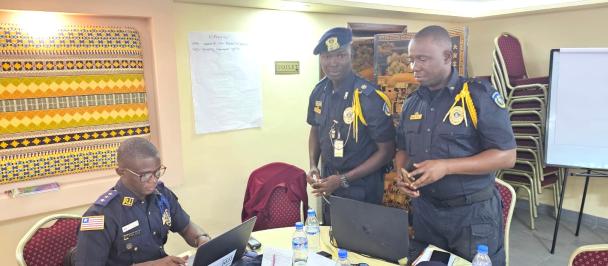These traditional mechanisms are are not designed to deliver justice for the large-scale human rights violations and atrocities that characterized Liberia’s civil wars.
This July in Saryah town in Liberia's Rivercess County, Taly stood up and spoke of the deep trauma he had experienced around 20 years ago during the civil war. In front of the gathered crowd, he described how rebel fighters had rounded up local villagers, flogged them, and forced them into the attic of a rice granary before setting fire to the building. He recounted how one assailant, named James, cut off Taly’s right ear and forced him to eat it.
“The man and his friends lied that I was an LPC fighter,” said Taly, referring to a different rebel group. “Some of us died from the beating and smoke.”
Listening to Taly’s account of violence during the Liberian civil war was a council of elders with training in human rights and alternative dispute resolution. Also in attendance was James, the accused, who is Taly’s neighbour and who spoke next.
“What he said is true,” he said. “Taly and I are friends. We drink liquor together. But I thought he forgot about what happened because he never talked about it before.” James pleaded for, and received, Taly’s forgiveness.
Scenes such as this have been happening in Liberia over the past five years as the country attempts to confront the extreme violence that characterised its two civil wars between 1989-1997 and 1999-2003. According to the National Truth and Reconciliation Commission (TRC), Liberia suffered “every conceivable category of gross human rights and serious humanitarian law violation” during this period in which over 250,000 people were killed, more than one million were internally displaced, and hundreds of thousands fled the country.
There are ongoing discussions as to whether Liberia should establish a war crimes court or transitional justice commission to account for the most egregious atrocities, but in the meantime, the country has been holding so-called Palava Hut hearings. These were recommended by the TRC and are based on traditional restorative justice and accountability mechanisms.
Facilitated by the Independent National Commission on Human Rights (INCHR) with support from UNDP Liberia, Palava Huts provide safe public spaces where victims meet face-to-face with perpetrators of alleged violations and air their grievances before a trained council of elders. Like James, the accused typically admit guilt and, consistent with the traditional conflict resolution practices of the Bassa people, demonstrate penitence by squatting before their victims when asking for forgiveness.
The Palava Hut Committee then scolds the perpetrator and consoles the victim, offering their own apologies for their suffering. Once forgiven, the victim and perpetrator share a drink of blessed water to symbolise “heart-cleansing”, a consummation of a moral and spiritual vow to let go of the past and embrace a future of reconciliation and peaceful coexistence.
Since 2016, these justice mechanisms they have been used in different parts of the country to address violations of “lesser magnitude”, ranging from looting and destruction of property, to certain acts of torture and humiliation, to forced labour and displacement. Most recently, Palava Hut hearings were held in Rivercess country, which saw the first ever committee of elders headed by a woman because of the male paramount chief’s own involvement in the civil war. 49 cases were heard in the county, 48 of which were amicably resolved. This means that so far 259 cases have been resolved through Palava Hut hearings, and that 483 people helped have to deal with the trauma they experienced rebuilding social cohesion in their communities.
These traditional justice mechanisms are not designed to deliver justice for the large-scale human rights violations and atrocities that characterised Liberia’s civil wars. They may also do little in terms of addressing the serious physical and economic repercussions of victim’s experiences. But for many that have confronted their assailants through Palava Hut hearings, just being seen, heard, and asked for forgiveness can be hugely significant – as Sundaygar’s experience shows.
He told the Palava Hut hearing about how a fighter called Sabato and two others tortured and abused his family in 1994 in the village of Neezuin.
“Sabato asked my father to give them his single barrel gun. My father told them the gun was burned with our house. They got vexed and tied my father, my stepmother and I, and beat us with gun butts,” said Sundaygar, before going on to describe other forms of violence the fighters unleashed on them.
“Sometimes we forget some of what we did,” responded Sabato when it was his turn. “I didn’t ’t come here to argue. I apologise to Sundaygar and his family.”
For Sundaygar, this was enough for him to resolve his hurt and bitterness and end the matter. “This has been what I wanted,” he said. “Acknowledgement and an apology.”
This article was first published by African Arguments.

 Locations
Locations






